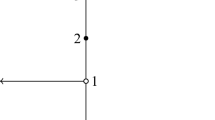Abstract
We give sufficient conditions for the equivalence between two equilibrium problems. In particular we deduce that, under suitable assumptions, an equilibrium problem has an equivalent reformulation as a generalized variational inequality. Such conditions are satisfied when the equilibrium bifunction is lower semicontinuous, coercive and quasiconvex with respect to the second variable. We also show that the equivalent generalized variational inequality inherits the same generalized monotonicity properties of the original nonconvex equilibrium problem.
Similar content being viewed by others
References
Blum, E., Oettli, W.: From optimization and variational inequalities to equilibrium problems. Math. Stud. 63, 1–23 (1993)
Iusem, A.N., Sosa, W.: New existence results for equilibrium problems. Nonlinear Anal. TMA 52, 621–635 (2003)
Chadli, O., Konnov, I.V., Yao, J.C.: Descent methods for equilibrium problems in a Banach space. Comput. Math. Appl. 48, 609–616 (2004)
Konnov, I.V., Ali, M.S.S.: Descent methods for monotone equilibrium problems in Banach spaces. J. Comput. Appl. Math. 188, 165–179 (2006)
Zhu, D.L., Marcotte, P.: An extended descent framework for variational inequalities. J. Optim. Theory Appl. 80, 349–366 (1994)
Konnov, I.V.: Generalized monotone equilibrium problems and variational inequalities. In: Handbook of Generalized Convexity and Generalized Monotonicity. Nonconvex Optim. Appl., vol. 76, pp. 559–618. Springer, New York (2006)
Clarke, F.H.: Optimization and Nonsmooth Analysis. Wiley, New York (1983)
Penot, J.-P., Quang, P.H.: Generalized convexity of functions and generalized monotonicity of set-valued maps. J. Optim. Theory Appl. 92, 343–356 (1997)
Zheng, L.C., Yao, J.C.: Modified combined relaxation methods for general monotone quilibrium problems in Hilbert spaces. J. Optim. Theory Appl. 131, 469–483 (2006)
Mastroeni, G.: Gap functions for equilibrium problems. J. Glob. Optim. 27, 411–426 (2003)
Konnov, I.V., Schaible, S., Yao, J.C.: Combined relaxation method for mixed equilibrium problems. J. Optim. Theory Appl. 126, 309–322 (2005)
Hiriart-Urruty, J.B., Lemaréchal, C.: Convex Analysis and Minimization Algorithms. Springer, Berlin (1993)
Mastroeni, G.: On auxiliary principle for equilibrium problems. In: Equilibrium Problems and Variational Models. Nonconvex Optim. Appl., vol. 68, pp. 289–298. Kluwer, Norwell (2003)
Bianchi, M., Schaible, S.: Generalized monotone bifunctions and equilibrium problems. J. Optim. Theory Appl. 90, 31–43 (1996)
Author information
Authors and Affiliations
Corresponding author
Additional information
Communicated by F. Giannessi.
Rights and permissions
About this article
Cite this article
Castellani, M., Giuli, M. On Equivalent Equilibrium Problems. J Optim Theory Appl 147, 157–168 (2010). https://doi.org/10.1007/s10957-010-9703-4
Published:
Issue Date:
DOI: https://doi.org/10.1007/s10957-010-9703-4




